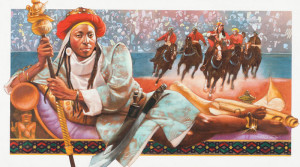 |
| Painting of Queen Amina (3) |
Amina was born around 1533 and her father, Nikatua, was the ruler of Zazzau at the time (also called Zaria). Around thirty years after Amina was born her father passed away, leaving the kingdom to Amina's brother. While her brother ruled, Amina trained in the Zazzua military, quickly becoming a fierce and respected warrior. Because of her military experience and skill, she was able to inherit the throne after her brother passed away, making her the first Queen of Zazzau. Amina's rule focused on expanding her empire. She led an army of around 20,000 men through cities, conquering them and increasing the wealth of her own (3). It is believed that she spent her entire thirty-four years as queen battling for territory with her powerful military.
Another surprising aspect of Queen Amina's rule is the fact that she was never married. There is a legend that says, "she took a different husband each night as she led her army in its campaigns. Then in the morning she had him beheaded," (2). She wanted to lead an independent life and her achievements, decisions, and rules were respected by her people. Her legacy lives on in her home country of Nigeria where she is known as “Amina daughter of Nikatau, a woman as capable as a man," (1). There are statues of her (typically depicting her in combat), commemorating her bravery and strength as a ruler and warrior.
Historical and Cultural Impact
 |
| Statue of Queen Amina in Lagos, Nigeria (4) |
I found her story to be surprising and interesting. There are often preconceptions of women's roles in history and Queen Amina definitely breaks those assumptions. Her ability to rise to the position of power through her military accomplishments is one example. Also, her decision not to marry is another surprising factor. Although slaying her lovers does seem a bit extreme, her ability to have multiple sexual relations and still be respected by her people is an amazing accomplishment for the period she was living in. Although her role was a bit unusually for her culture, she was able to navigate the obstacles and rise to the top in a way that probably would not have been possible after British colonization. Her legacy and unique role in African Culture are both inspiring and important especially for women of Nigeria's modern patriarchal society.
Works Cited
(1) “Amina.” Wikipedia, Wikimedia Foundation, 20 Oct. 2019, https://en.wikipedia.org/wiki/Amina#cite_note-:0-2
(2) McCollum, Sean. “African Queens: The True Stories of Three of the Most Extraordinary Women of the Ancient World (World History).” Junior Scholastic, no. 14, 2004, p. 15. EBSCOhost, search.ebscohost.com/login.aspx?direct=true&db=edsric&AN=edsric.A114325981&site=eds-live&scope=site.
(3) “Queen Amina of Zaria " African Feminist Forum.” African Feminist Forum, 25 Mar. 2016, http://www.africanfeministforum.com/queen-amina-of-zaria-nigeria/.
(4) “Queen Amina Sculpture .” Pinterest, https://www.pinterest.com/pin/549650329499654957/?lp=true.




After reading your blog post, I think it's awesome that she never got married and fulfilled that "Disney princess" aspect that most of us grew up idolizing. I also agree with you that maybe beheading her sexual partners was extreme but for her to still be respected after being known like this is amazing. This is another stigma that needs to be changed in today's society.
ReplyDeleteI found it extremely fascinating that a woman would be able to have so much power and so much control over her body in the 1500's. I believe that her strength and courage to do so played a huge part in her society into overcoming British colonization and what allowed her to be the first queen to rule.
ReplyDeleteI love that being sexually confident did not distinguish her abilities to be a powerful and respected woman.
ReplyDeleteI enjoyed your piece! It is refreshing seeing a woman who practically acts and thinks like a man, and simply does not care what others think. She really does what she wants to do.
ReplyDelete